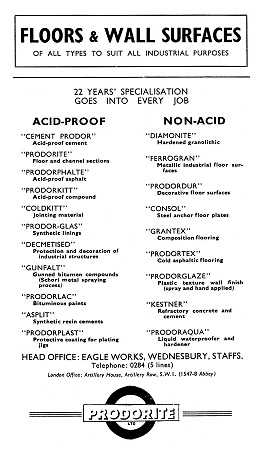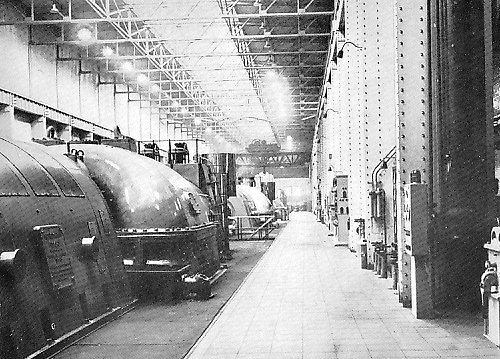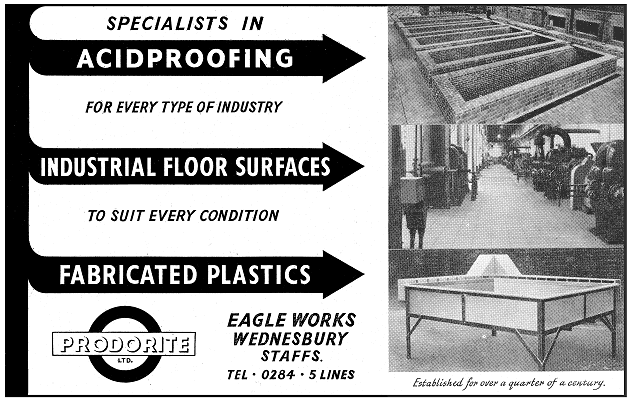| Prodorite Limited
Prodorite Limited was registered in London on
14th September, 1925, and soon opened the
company's factory and offices at Eagle Works,
Leabrook Road, Wednesbury.
Prodorite was named after 'Prodorit', a
corrosion proof pitch concrete material
developed in the early 1920s in Switzerland by
Produits Organiques. The Swiss firm developed a
process for manufacturing sugar from wood under
the trade name 'Prodor'. The process produced
corrosive substances, and so 'Prodorit' was
developed.
Prodorite acquired the manufacturing rights
for 'Prodorit' and further developed and
improved the product. Initially sales were poor
because businesses were reluctant to spend money
on improving the conditions in their workshops
and factories. |
|

An advert from 1957. |
|

An advert from 1949. |
| Sales began to improve in the mid 1930s when
the government ordered a number of new power
stations, each of which was to have fume
chimneys with acid-proof linings. The acid-proof
linings were made of Prodorite's anti-corrosive
cement, which was ordered in large quantities.
Within a few years the corrosion proof materials
were in great demand for use in the many
ordnance factories that were built as part of
the re-armament programme in readiness for the
Second World War.
During the war Prodorite was almost entirely
engaged in servicing the ordnance factories, and
employed over 500 people to carry out the work. The company also applied protective coatings
to the water tanks that were used in armoured
vehicles. In order to carry out this work,
Prodorite acquired Junction Works on the corner
of Leabrook Road and Potters Lane. After the
war, Junction Works was used for plant and
vehicle maintenance. |

Some of Prodorite's heavy duty
industrial flooring installed at a power station.
| In the late 1940s Proderite quickly realised
the usefulness of the newly developed plastic
materials and began to produce a range of
products including polythene, and p.v.c.
Although there was little interest at first,
sales eventually improved, which led to the
formation of the Plastics, Fabrications,
Linings, and Coatings Division based at the
William Burton Works, named after the company's
founder. Prodorite continued to develop new
specialised products which were widely used in
the building industry, and for leisure and
sporting activities. Many uses were found for
the acid-proof coatings in nuclear power
stations, the steel industry, the chemical
industry, the fertiliser industry, and in the
food and drink industry. Industrial floor
coatings were also developed including the well
known 'Ferrogan' steel-faced flags, 'Consol'
steel anchor floor plates, and 'Prodordur'
in-situ floor covering.

An advert from 1954.
By the 1970s over 500 people were employed at
Eagle Works, which was organised into three
divisions:
| The
Materials Division controlled
manufacturing, development, and
marketing. |
| The
Contract Division oversaw
contract work, and the design and
installation of industrial plant. |
| The
Plastics Division controlled
plastic fabrication, and coating
work. |
|
| In 1968 Prodorite took over W. Chattaway
Limited , construction engineers, and steelwork
fabricators based in Great Bridge, in order to
extend the structural steelwork operations.
W. Chattaway Limited had previously been
acquired by Proderite's founder, and former
chairman William A. Burton in 1941. Its
acquisition allowed Proderite to produce
warehouses, welded fabrications, and roof
trusses. Prodorite had been working with
Chattaways since the 1950s, jointly producing
continuous strip pickle tanks. |

An advert from 1977. |
| In the 1960s and 1970s the extended product
range included steel framed structures with up
to a one hundred foot span, general fabrications
up to 8 tons, roof tracks for window-cleaning
high rise buildings, and special bodies for road
vehicles. Like many other local manufacturers,
Prodorite was taken over. The corrosion proof
products are now made in India, and all traces
of Eagle Works have disappeared. |
|
 |
Return to the
previous page |
|